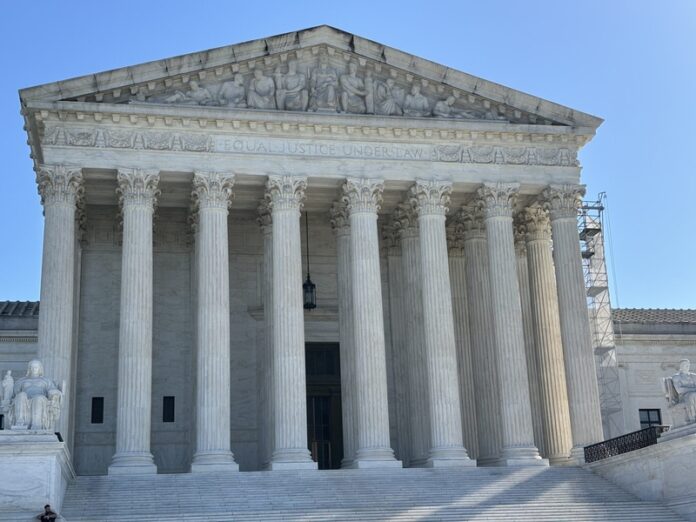
WASHINGTON (States Newsroom) — The U.S. Supreme Court on Friday kept in place a block on the Trump administration’s efforts to deport 176 Venezuelans in Northern Texas under the Alien Enemies Act of 1798.
A majority of the justices found that President Donald Trump’s administration violated the due process rights of Venezuelans when the administration tried to deport them from North Texas last month by invoking the 18th-century wartime law. Conservative Justices Samuel Alito and Clarence Thomas dissented.
“Under these circumstances, notice roughly 24 hours before removal, devoid of information about how to exercise due process rights to contest that removal, surely does not pass muster,” according to the decision.
The justices did not determine the legality of the Trump administration using the Alien Enemies Act to deport Venezuelans 14 and older with suspected ties to the gang Tren de Aragua.
On his social media platform, Trump expressed his disapproval of the ruling.
“THE SUPREME COURT WON’T ALLOW US TO GET CRIMINALS OUT OF OUR COUNTRY!” he wrote on Truth Social.
The justices found that the 5th Circuit Court of Appeals “erred in dismissing the detainees’ appeal for lack of jurisdiction,” and vacated that order, sending the case back.
The Trump administration on Monday asked the high court to remove the injunction, arguing that detaining suspected members of Tren de Aragua poses a threat to U.S. Immigration and Customs Enforcement officers and staff.
In a Wednesday response, the American Civil Liberties Union, which brought the suit, warnedthat if the Supreme Court lifts its injunction, “most of the putative class members will be removed with little chance to seek judicial review.”
In Friday’s order, the justices noted that because the Trump administration has used the Alien Enemies Act to send migrants to a notorious prison in El Salvador, careful due process is needed.
“The Government has represented elsewhere that it is unable to provide for the return of an individual deported in error to a prison in El Salvador…where it is alleged that detainees face indefinite detention,” according to the order, noting the wrongful deportation of Maryland man Kilmar Abrego Garcia to El Salvador.
“The detainees’ interests at stake are accordingly particularly weighty,” the court continued.
Other rulings
On April 18, the ACLU made an emergency application to the high court, asking to bar any removals under the Alien Enemies Act in the Northern District of Texas over concerns that the Trump administration was not following due process.
Several federal judges elsewhere have blocked the use of the wartime law in their districts that cover Colorado, Southern Texas and Southern New York.
A federal judge in Western Pennsylvania Tuesday was the first to uphold the Trump administration’s use of the Alien Enemies Act, but said those accused must have at least three weeks to challenge their removal.







